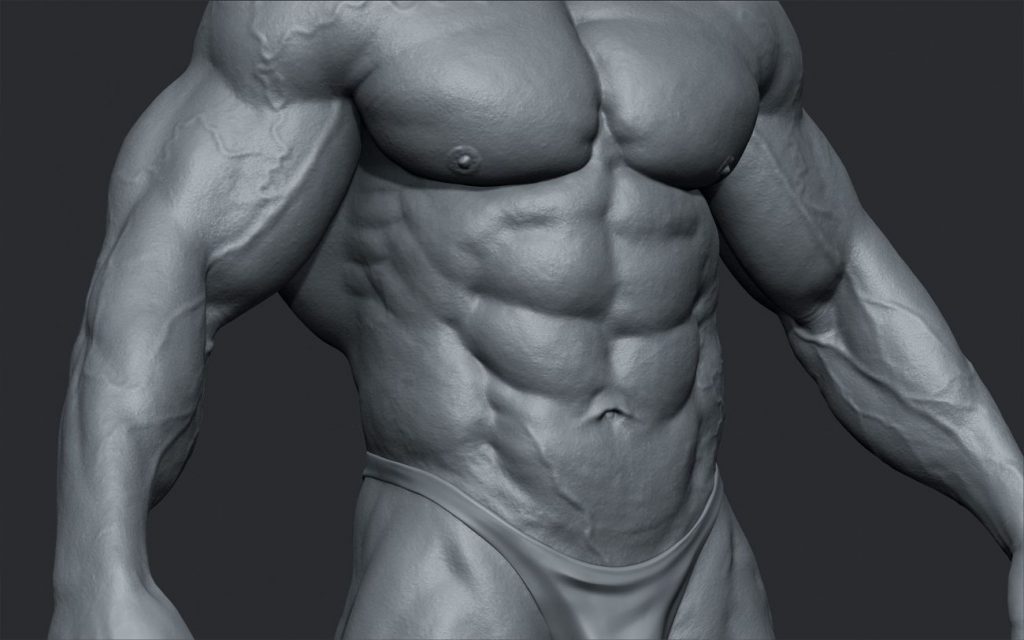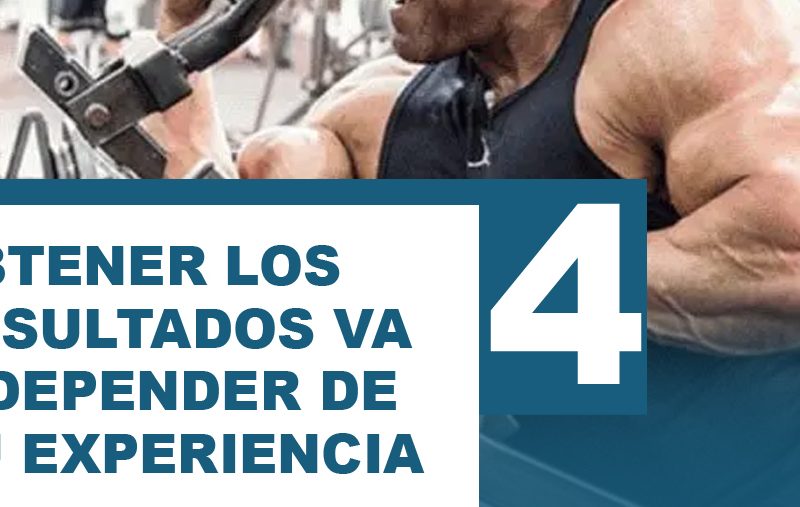Training in general can reduce stress and provide psychological benefits that can help improve your physical health.
stress can be defined as a personal response to a physical, chemical, emotional or environmental factor or factors and does not necessarily have to be bad, since it can act as a motivator or energizer.
This factor for a bodybuilder can be the push they need to respond to a specific situation, such as meeting a deadline or avoiding a dangerous situation, including in their family, social or professional life.
Stress: Physiological Reactions
stress creates a physiological reaction that tells our mind to “move” (fight or flight reaction).
As part of this “fight or flight” reaction, our bodies release adrenaline also known as stress hormone , which can cause an increase in blood pressure, an increase in body temperature central and heart rate, as well as putting all our senses on “jake”: “it’s almost a purely animal response.”
In a positive sense, this reaction can be a survival tool that helps keep our bodies strong and our minds on alert.
Stress: Psychological Reactions
The symptoms of stress include anxiety, fear, irritability or bad mood, it can also affect thoughts, causing low self-esteem, worry, lack of concentration, worry and forgetfulness, thus affecting behavior .
Some psychological reactions include:
- Speech difficulties (lightheadedness, grasping for words, etc.).
- Crying episodes for no apparent reason, nervous or uncontrollable laughter,
- Neglect or inattention resulting in poor training, overeating or under-eating, increased drug and alcohol use.
- Lack of sleep or insomnia.
Well, all this destroys the mind in the long term and this is fatal not only for sports life, but also for general well-being.

Chronic Stress : symptoms?
Chronic stress can have devastating effects: it causes the body to produce too much cortisol and adrenaline, which can cause physical symptoms that can range from mild mood disturbances to serious related illnesses. with stress.
According to an American study developed by the American Medical Association, stress was declared to be the cause of 80 to 85% of all human diseases or, at least, to have harmful effects on health.
There is evidence to support that ongoing work-related distress can lead to illnesses ranging from cancer to mental illness.
What happens is that 80% of medical attention is spent on disorders related to stress ; These ailments include cardiovascular disease, hypertension, headaches (including migraines), ulcers, anxiety, allergies, asthma, and cancer.
If it is chronic and constant, it can also inhibit the immune system, making the body more susceptible to diseases or, failing that, it cannot adequately withstand the onslaught of viruses.
Stress: Effects of Exercise
Several studies by respected organizations have shown that physical activities can:
Training in general provides psychological benefits that can help improve physical health, as it acts as a buffer against stress .
When we’re in the gym, training helps us forget all the stresses of the outside world (deadlines, finances, family problems, relationship problems, etc.), and it works because we focus intensely on every rep, every movement, we feel the weight and we control our breathing, that is, we are very attentive and extremely concentrated.
Once we start our training and feel the hot blood rushing through our veins, feeding those thirsty muscles, we will begin to feel peace and any stress that we had when entering the gym begins to disappear.
As we imagine that our muscles get bigger, stronger, harder, more striated, denser and more mature, the stresses, worries, schedules and mental demands in our life disappear, at least in our sports life.
Bodybuilding and neurotransmitters
Every successful bodybuilder knows the feel of the pump and the “zone” to which it can transcend. Perhaps Arnold was right when he spoke in the “Pumping Iron”, that bodybuilding is like sex, since the reason that exercise can produce feelings that are often described as “as good as sex”, is because the Exercise causes the brain to release endorphins.
Endorphins are substances similar to some active ingredients that not only relieve pain (which is why bodybuilders can continue to break through pain barriers), but also produce a feeling of comfort, well-being and what is often described like euphoria.
Exercise with weights also stimulates nerve cells in the brain to secrete other important neurotransmitters (serotonin, dopamine, and norepinephrine) that are known to have positive effects on well-being.
If we haven’t experienced this feeling of euphoria, we should go to the gym and work hard for at least 90 hard minutes to feel it, it’s great right? !.
Now, if exercise is so beneficial, why do so many bodybuilders feel so stress ?.
Competitive bodybuilding: is it different?
As everyone has told us since childhood, when something is taken to the extreme, the positive effects that were once observed can diminish (or be erased) and in many cases, the positive effect can turn negative.
Competitive sports can encourage extreme actions, and competitive bodybuilding is not immune to such behavior; Sad examples include competitors who have collapsed on stage due to deliberate dehydration.
There is the obvious stress in the gym, but it is not in contrast to the stress of a competition, as there are many hidden tensions that those who have never dared to take for granted going on stage … these stressful sensations are some that a competitive bodybuilder faces …
- The desire to succeed.
- The expectations of others (friends, family, partner, bodybuilding community, the press, asshole influencers, etc.)
- Balance time requirements for commitments: to do cardio, tanning, poses and hard preparation training, which must be combined with other work, social and family commitments / obligations.
- Prepare the food.
- Eat when someone else has prepared the food.
- Sleep less due to increased commitments.
- Feel the effect of reducing calories in the body.
- Investing in clothing, diet and training, and even doing it when a competition starts … it usually happens with last minute accessories …
- Shaving in areas you can’t reach and feeling too embarrassed to ask for help.
- Trying to find the “right” music to pose (and hope it hasn’t been played before going on stage).
- Choreograph and practice the pose routine.
- Develop mental games in front of the mirror:
Anyway, stressors also come into play here with questions such as: Am I big enough? Am I thin enough? Am I flat? Am I symmetrical? Among other things.
Stress: Effects on the Pro Bodybuilder
Chronic stress affects health and sports performance in many ways, from quality of life to health, therefore it is a great concern for the competitive bodybuilder, as it causes the adrenal cortex to release elevated cortisol levels in response to one or more stressful situations.
Cortisol:
- It prevents muscle repair and function,
- Decreases testosterone production,
- Inhibits protein synthesis,
- Accelerates proteolysis (protein breakdown) and,
- It prevents muscle growth.
To make matters worse, it also reduces the body’s ability to use fat for energy, increasing the amount of fat stored within the body. Are we talking about insulin, right?
How to solve this imbalance? Take the correct supplementation
Stress: Is it related to insulin?
In addition, stress causes many to eat too many carbohydrates, “a feel-good meal” that raises serotonin levels.
The problem here isn’t just the extra calories from the added carbohydrates, but the fact that when carbohydrates are eaten in excess, insulin remains chronically high.
If this condition continues over time, cells adapt to elevated levels of insulin and become resistant to its function, causing the body to need additional insulin to transport sugar into cells for energy.
- The persistent and long-term elevation of insulin and glucose in the bloodstream also has other negative effects on the body, causing a decrease in the breakdown of sugar resulting in increased storage as adipose tissue (fat body).
- High blood sugar also makes blood vessels and blood components “sticky.”
Both effects reduce blood flow to all areas of the body, especially the feet, eyes and kidneys. It is also believed that insulin resistance can lead to type 2 diabetes and lower levels of growth hormone in the blood.
Stress: Does it have a solution?
Although cortisol release cannot be prevented, nor insulin spikes, it is possible and should be controlled through moderate exercise, diet, supplements, and stress management.
In this context, we propose to everyone, enjoy a master class given by Xisco Serra for MASmusculo.
Now, there are several ways to manage stress effectively, and the competitive bodybuilder can use many of these tools that we cite below:
Before talking about some of the things inherent to breaking or breaking stress, use your positive thinking and avoid focusing on situations where you have no control over the outcome, instead,
Focus on the things you can do something like your training and your diet, using your positive energies to gain gains in the area that you can control, plus:
- Learn relaxation techniques: it would be ideal to practice an oriental activity, yoga or do massages to infuse additional oxygen into the blood, burning toxins and recharging the body’s batteries, while you breathe better and thus stimulate all your systems .
- Sleep better: Quality sleep will not only effectively grow your muscles through a good recovery, but also reduce stress in the long run.
- Eat wisely: use foods such as complex carbohydrates that trigger the release of the brain neurotransmitter serotonin, in addition to adding other nutrients that in addition to giving you energy, will allow you to regulate blood sugar (hence insulin); a factor not always recommended is to control excess salt that increases blood pressure and depletes the adrenal glands.
Stress: what supplements to use?
Since stress can deplete vitamins and minerals, we should take into account a good multivitamin, B vitamins that help energy metabolism, glutamine
On the other hand, glutamine can help reduce cortisol by supplying cortisol with glutamine in the blood, however, the dose must be controlled.
In addition, you can choose a number of natural supplements, ranging from maintaining your mood to sleeping better.
Stress: what about water?
In addition to exercise and a well-balanced diet, it is important that your body receives enough water, since like oxygen, it is essential for your body to function efficiently, in addition to helping to regulate body temperature.
Water is also necessary for the effective conduction of nerve impulses, proper metabolism, food processing, waste removal, and a healthy immune system.
Stress and caffeine (both common to the competitive bodybuilder) can affect the amount of water we lose (through excretion, respiration, perspiration) and the rate at which the body loses it.
Any of these factors, alone or in combination, could cause a small but critical contraction of the brain that can affect neuromuscular coordination, decrease concentration and slow thinking.
For the average person, it is recommended that they consume 8 to 10 cups of water a day, so if you train hard or are a competitive bodybuilder you should consume much more than that.

Conclusions
Remember, weight training can be a powerful method of relaxation and is a powerful tool to combat and prevent stress .
You should also remember and apply the old adage that says: “too much of a good thing is not necessarily good”, therefore you should think about indulging yourself from time to time:
- Try a massage, as it can relax muscles, relieve muscle spasms, increase blood flow to the skin and muscles, relieving mental and emotional stress .
- Take an energetic nap; Studies show that a 15-minute nap can recharge you and increase your physical and mental performance.
- Finally, think of an activity that makes you feel good, as simple as a walk in the park with the dog, doing charity or just listening to good music.
All the little activities that you enjoy can be very effective in alleviating it and, in this context, you should not let bodybuilding take over.
The way you respond to stress is your choice



